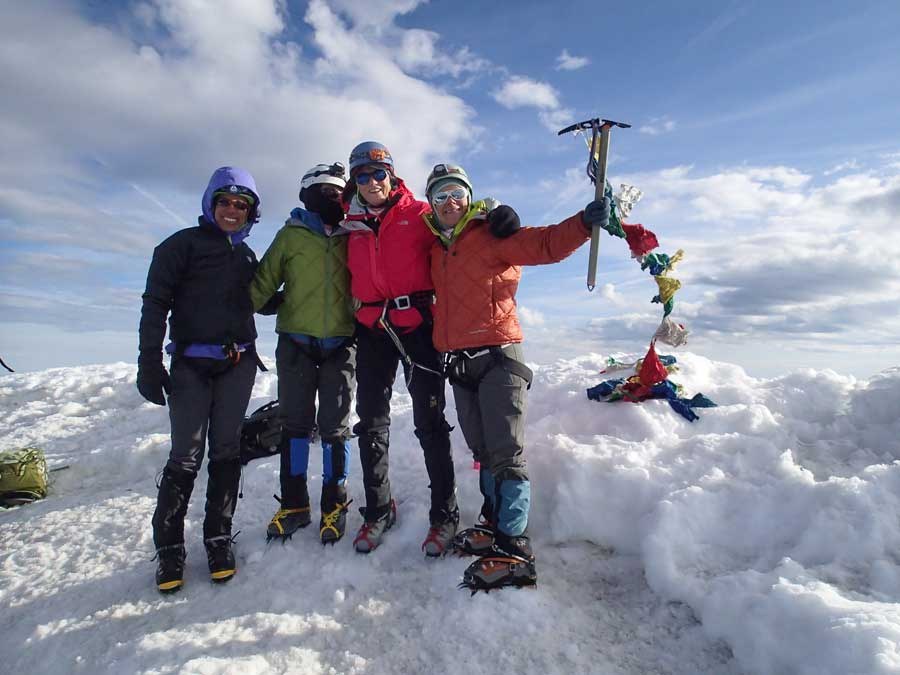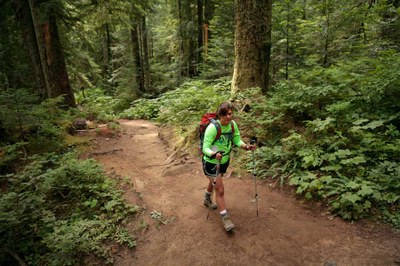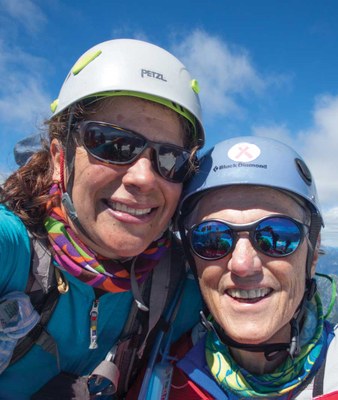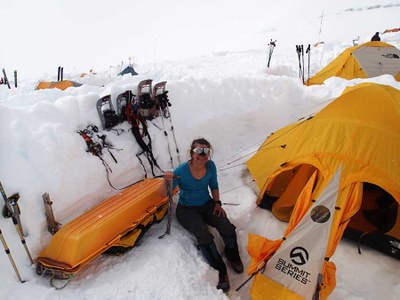
by Diane Mapes, Fred Hutch News Service
Life is all about mountains for Marybeth Dingledy — not just the kind you scale, but the rugged terrain you have to slog up, over, around or through when life goes sideways.
An accomplished outdoorswoman with a dozen major peaks under her belt, Dingledy has been hit by a car while bicycling (she landed on her face and bounced), suffered a close call with pulmonary edema and been blindsided by both an inherited BRCA2 gene mutation and breast cancer. The bike accident left her with a broken nose, broken teeth and a concussion. The BRCA mutation and cancer diagnosis took her ovaries, her uterus and her breasts.
It’s enough to make anybody curl up in a fetal position, but Dingledy just keeps climbing. As do the unsolicited donations her tenacity inspires. At last count, the 46-year-old Snohomish County Superior Court judge has brought in more than $100,000 for Fred Hutch’s Climb to Fight Breast Cancer, no small feat considering she hasn’t been able to ask anyone for a dime since being appointed to the bench in early 2012.

“For me, it’s all about moving forward and not letting something bring me down,” she said. “It’s about counteracting the bad with the good. I signed up [to climb] Denali the same day I scheduled my hysterectomy because it would motivate me to start working out as soon as that surgery was done. I focused on training to climb Denali instead of feeling sorry for myself.”
On July 18, 2015 Marybeth added another notch to her backpack by summiting Mount Shuksan, a stunning alpine peak located in North Cascades National Park.
“It was spectacular,” she said. “Surreal. And there was a wonderful surprise twist.”
We caught up with Marybeth while she was training for Shuksan — and again after the climb — to pick her brain about breast cancer, backpacking and her all-around audacity — and, of course, to learn more about that amazing surprise atop Mount Shuksan.
Have you always been outdoorsy?
I didn’t hike or backpack when I was a kid and my first camping trip was when I was 27 or 28. The first time I went backpacking was at Cape Alava. It was three miles and we carried our own firewood, which was ridiculous because there was driftwood on the beach. We also carried our water; we didn’t have a filter. I’ve learned a lot since that early misadventure.

I started climbing in 2006. I was playing soccer at the time and some friends were talking about climbing Mount Rainier for breast cancer research. I decided to go to a talk at REI and it was a Climb to Fight Breast Cancer talk. I tried to sign up for Rainier but it was full so I signed up for Mount Baker instead. That’s when it started. I got hooked and now I go every year. I haven’t summited every year, but I’ve climbed every year.
How many mountains have you climbed for Fred Hutch?
My first climb was Baker. After that, there’s Rainier, the two volcanoes in Mexico [El Pico de Orizaba and Iztaccihuatl or “Itza”], Kilimanjaro, Shasta, Olympus, Hood, Denali, Aconcagua and Adams. [And now Shuksan.]

Can you talk about the BRCA mutation in your family, your diagnosis and your surgeries?
I inherited the BRCA2 mutation from my father. Two of his sisters had the gene and they’re breast cancer survivors; my grandmother died of it. I’ve had some cousins diagnosed, too. There have been a variety of cancers in our family.
When I found out I was BRCA2 positive in 2003, I remember just sitting on the floor and huddling up and crying. I was 34. The Seattle Cancer Care Alliance clinic initially recommended a prophylactic mastectomy at 40, but I went in again before that to see if anything had changed and there were new recommendations. Now, they recommended a prophylactic oophorectomy and a hysterectomy, and I did that in October 2011. By the time I made the decision to have it, I was 43. I didn’t really want to go into menopause but considering the alternative, I decided to have it. It should have cut my breast cancer risk down by half but unfortunately, I was diagnosed the next year.
I had what I call my “booberectomy” in December; I had no other treatment. The surgery was on a Tuesday. By the following Sunday, I was back on my exercise bike. I was focused on training to climb Denali. And of course, that was when I got hit by a car on my bike. I was in the best shape of my life — that was three weeks before my Denali climb.
What happened with Denali?
I got high altitude pulmonary edema and had to turn around at 11,200 feet. I was in the first week of the trip and had been feeling great, but woke up at 4 a.m. and heard gurgling in my lungs and I knew they were starting to fill up with blood. I had to get evacuated off the mountain. If you don’t descend right away, you drown in your own blood. But I was on the mountain for my six-month anniversary [of my bilateral mastectomy] and that’s what I wanted.
How has cancer shaped your life?
Had I not found out I had the BRCA2 gene mutation, I don’t know if I would have done everything I’ve done in my life. After that, I started taking advantage of every single opportunity that came my way. You never know how long you’re going to be here. It could be breast cancer or a car accident on the way to work. And there are so many amazing things to see here in the Northwest. And to do — it’s a shame to not take advantage of those things.
I just think you’ve got to live your life, so live it, whether you have crappy genes or not.
What do you do for fun?
I lead backpacking trips for Sierra Club once or twice a year. I volunteer with the Boys and Girls Club and take care of foster kittens. I also garden and love to cook and of course, I love hiking.
I very rarely sit on the couch. We got rid of cable TV because I never watched it. I don’t have an “off” button. I keep hoping one will show up, but no.
Are you trying to keep cancer at bay by bumping up your activity and exercise?
I exercise for my mental and physical health. With or without cancer, eating healthy and exercising are so important. You feel better in so many ways. Plus, how you feel about your looks certainly plays a part in your mental health.
I used to not see my toes in the shower because of my chest. I don’t want it now to be because of my stomach. Exercise is something I have control over, unlike the genes and the cancer.
What do you get out of climbing?
There’s a better view from the top of everything.
Can you talk a little about the fundraising you’ve done for cancer research?
I used to think that the money we collectively raised through climbing would help those who were diagnosed after we were. And it does. But it also can help us. My breast cancer was detected through an MRI after a mammogram revealed nothing just a month or so earlier. MRIs really were not widely used for early detection when I was told that I had the breast cancer gene. One of the reasons that my recommendation for a prophylactic mastectomy changed between 2003 and 2010 was because of all the new research with MRIs and breast cancer.
So, with me, I feel like I directly benefited from the money I raised. I also see [stage 4 patients] benefiting from this research. We are investing in our own futures as well as those who have not yet developed cancer.
Do you have any advice for newbies or cancer survivors thinking about trying a climb?
Just do it. You’ll meet a great community of people, there are great guides and you don’t need to have experience. It’s a great way to make a positive spin out of a negative part of your life. Anybody can do this, even a girl from Connecticut who didn’t grow up hiking and never camped until she was in her late 20s.
What happened on Shuksan that was so amazing?
One of our teammates couldn’t join us, so we texted long-time Hutch climber Lynn Lippert, who lives in Portland and had been trying to get on the Shuksan climb for months, to see if she could join us in 14 hours. She made it happen.
Lynn is 73 and has stage 4 breast cancer. It’s in her bones. She climbs every year and has raised almost $350,000 for the Hutch. She was my roommate when we climbed the volcanoes of Mexico in 2008 and we became friends. I even married her and her longtime partner, Sal, three years ago.
Lynn taught me that there’s nothing wrong with foregoing reconstruction, that you can be strong and positive no matter what you hear from other people and that moving forward and surrounding yourself with good friends is as important as following medical advice. She’s a superstar, a real mentor. I’ve never seen her be negative, which is pretty amazing given her story.
Lynn and I, survivors and friends, shared a special time at the summit, such a wonderful surprise twist to an amazing climb.
This story was reprinted with permission of Fred Hutchinson Cancer Research Center where Diane Mapes is a staff writer. She has written extensively about health issues for NBC News, TODAY, CNN, MSN, Seattle Magazine and other publications. A breast cancer survivor, she also writes the breast cancer blog doublewhammied.com. Reach her at dmapes@fredhutch.org.
Add a comment
Log in to add comments.Such an inspiring story to know about people fighting with the cancer disease so strongly. I feel proud about it, my sister is also a breast cancer survivor. She was diagnosed with breast cancer a few years back and had fought with it very bravely and effectively. The oncologist suggested us with the radiation therapy Bronx( http://www.advancedradiationcenters.com/cancers/breast-cancer/ ) for her treatment. I was with her all the time supporting her in this way. Her breast cancer radiation Suffolk treatment carried out well and she is fine now with quiet a good health.
 The Mountaineers
The Mountaineers